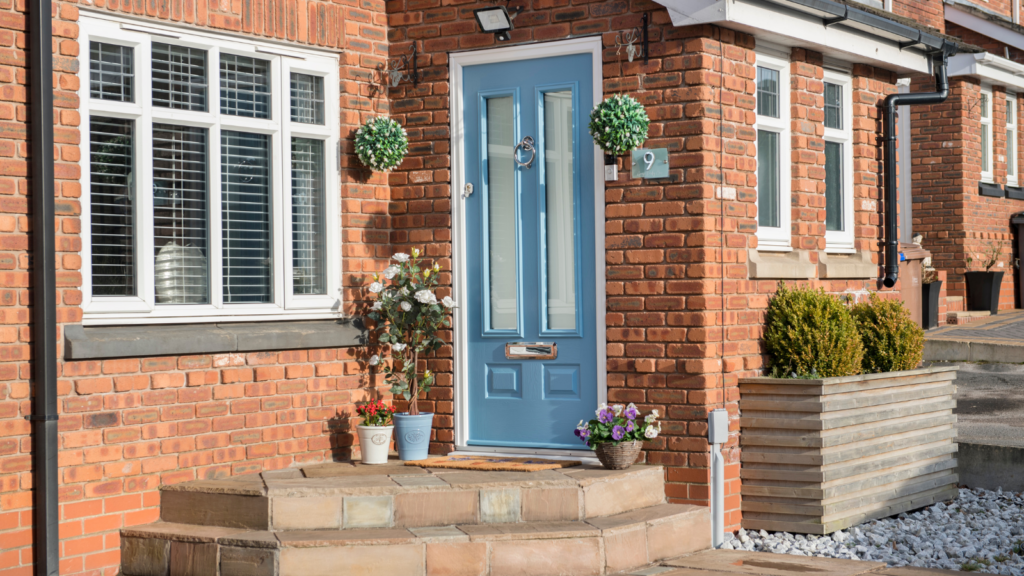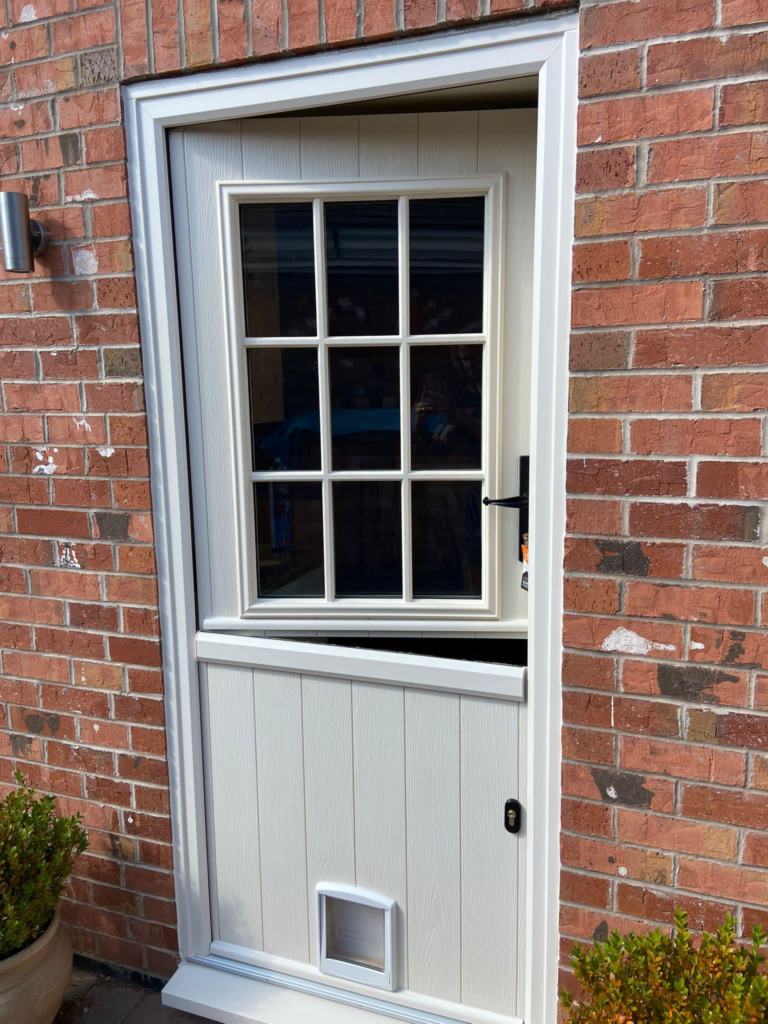Last Updated on 11th June 2024 by Tia Ellahi
In the realm of home design and renovation, choosing the right doors plays a crucial role in enhancing both the aesthetics and functionality of a living space. With a wide variety of door trends and options available, making the right choice can be challenging.
Glazed doors have gained popularity over the years due to their seamless blend of style and practicality.
This article will explore what a glazed door is, examine the various benefits they bring to a space, and ultimately answer the question, “Are glazed doors worth it?”.
What is a glazed door?
A glazed door, often referred to as a glass door or a door with glass panels, is a type of door that integrates glass into its structure. These doors feature one or more glass sections, ranging from small windows to large, full-length panels. The glass can be clear, frosted, tinted, or textured, tailored to suit your preferences and requirements.
Glazed doors are highly adaptable and available in a variety of styles, from traditional to contemporary, making them suitable for various architectural and interior design themes. They are frequently used as entry doors, patio doors, interior doors, or even as room dividers.
Glazed door benefits
Choosing to invest in glazed doors is a decision that requires careful consideration of their numerous advantages.
Here are some of the key benefits associated with glazed doors:
Noise reduction
One of the significant benefits of glazed doors is their ability to serve as an effective noise barrier. Glass panels can significantly reduce the transmission of sound between rooms or from outside to inside. This is especially beneficial for homes in noisy areas or for rooms that require acoustic privacy, such as home offices, libraries, or bedrooms.
The type of glass used in the door greatly impacts its soundproofing abilities. Options such as double or triple glazing, as well as acoustic glass, can further enhance the noise-reduction properties of glazed doors. By muffling unwanted sounds, glazed doors contribute to creating a quieter and more comfortable living environment.
Heat retention
Glazed doors also offer the benefit of enhancing your home’s insulation. The glass panels allow natural light to flood in, reducing the need for artificial lighting during the day and thus saving energy.
Moreover, the sunlight that enters can help warm up the interior, which is particularly advantageous during colder months.
To maximize energy efficiency, it’s essential to opt for energy-efficient glazing for your doors. This can include Low-E (low-emissivity) glass, which reflects heat back into the room, preventing it from escaping through the glass. This not only keeps your home more comfortable but also lowers heating costs, making glazed doors a smart investment from an energy-saving standpoint.

If you can’t find the perfect Solidor for your home, why not check out the newest colours.
Surprisingly durable
Contrary to popular belief, glazed doors are not inherently fragile. Advances in modern glazing technology have made the glass used in these doors both durable and secure. Toughened glass, which is a legal requirement for glazed doors, ensures greater strength and resistance to impact or breakage.
Beyond their durability, glazed doors are often designed to withstand the elements, making them ideal for exterior use. They are built to resist weather-related wear and tear, including UV exposure, moisture, and temperature fluctuations. As a result, glazed doors can retain their visual appeal and functionality over time, even when exposed to harsh outdoor conditions.
Are glazed doors a good investment?
Determining whether glazed doors are a worthwhile investment depends on your specific needs, preferences, and circumstances.
Consider the following factors to help you make an informed decision:
Aesthetics
Glazed doors add a distinct touch of elegance and sophistication to any space. They create an open, airy feel and allow natural light to permeate your home. If aesthetic appeal is a top priority for you, glazed doors are an excellent choice.
Energy efficiency
For those looking to enhance their home’s energy efficiency, glazed doors can be a great asset by reducing the need for artificial lighting and trapping heat. This can result in long-term energy savings.
Privacy and noise control
Glazed doors can provide privacy using frosted or tinted glass and serve as effective noise barriers, which is especially beneficial for homes in noisy areas or rooms where quiet is essential.
Longevity
Designed for durability, glazed doors resist environmental factors, ensuring they maintain their quality and appearance over time. At Timber Composite Doors, we offer a variety of glazed doors from manufacturers renowned for their high-quality products.
Maintenance
Consider the maintenance requirements for glazed doors. While they are durable, they may require more frequent cleaning, especially in homes with young children or pets. Fingerprints and smudges on glass panels can be more noticeable but are easily cleaned with a cloth and warm water, without the need for chemicals.

Need a door fitted with a cat flap hole? We can do this for you, please contact us for more information.
Budget
The cost of glazed doors can vary significantly depending on the type of glass, design, and size. It’s important to balance your budget with the benefits and aesthetic appeal they offer.
In summary, glazed doors provide numerous benefits, including enhanced aesthetics, energy efficiency, privacy, and noise control.
Whether they are worth the investment depends on your specific needs and priorities.
If you appreciate the advantages they offer and have the budget, glazed doors can be a valuable addition to your home.
Selecting the ideal glazed door for you
If you need any assistance or have questions, don’t hesitate to get in touch. You can call us at 01642 309571 for direct support.
Alternatively, you can contact us through our website or email, and our team will be happy to help you with any enquiries or provide further information.
We’re here to ensure you make the best choice for your home.
FAQs about glazed doors
What is the difference between glazed and unglazed doors?
The primary distinction between glazed and unglazed doors lies in the presence of glass panels. Glazed doors feature glass panels, while unglazed doors are typically made entirely of solid materials such as wood, metal, or other sturdy materials.
What is the purpose of glazed doors?
Glazed doors are designed to provide a balance of aesthetics and functionality, suitable for a variety of residential or commercial settings. They add an element of elegance and sophistication to any space, enhancing its visual appeal.
Where are glazed doors best used?
Glazed doors are a versatile and stylish option that can be utilized in various areas within a home. Their suitability depends on your specific needs and desired style. Common applications for glazed doors include:
- Interior and exterior doors
- Patio and garden doors
- Hallways
- Home offices or study rooms
Additionally, many homeowners are choosing glazed roofs to complement their glazed doors.
Can I customise the design of glazed doors?
Absolutely! Glazed doors are available in a wide range of styles, and you can customise them by selecting the type of glass, texture, and framing materials to match your interior or exterior design.